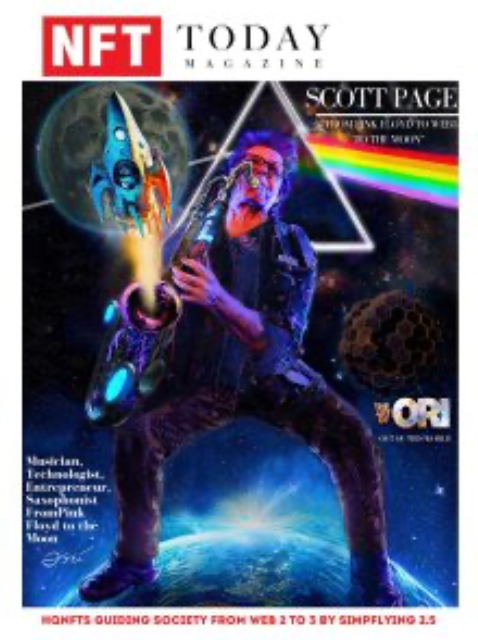Decentralized Science: How AxonDAO is Disrupting the Billion-Dollar Research Industry
Staff Writer • 2025-02-04
Scientific research is broken. Funding is locked behind bureaucratic gatekeepers, groundbreaking ideas die in committee meetings, and innovation is throttled by outdated institutions clinging to control. Enter AxonDAO, a blockchain-powered decentralized autonomous organization (DAO) looking to shake up the way science is funded and conducted. In a recent episode of the Stonks Go Moon Podcast, we sat down with Christopher Crecelius, Founder and CEO of AxonDAO, to unpack the concept of decentralized science (DeSci) and why blockchain might be the answer to a research industry plagued by inefficiency, favoritism, and red tape. The Problem With Traditional Science Funding The traditional scientific research model operates much like an exclusive club—one where only well-connected researchers, prestigious institutions, or politically favored projects secure funding. Universities, once meant to be public hubs of knowledge and innovation, have turned into bureaucratic fortresses, where researchers spend more time chasing grants than actually doing science. “Universities were originally meant to be open sources of knowledge for the public,” Crecelius explained. “But over time, that got away from its original intent. Now, the funding system is all about hierarchy, influence, and who you know.” This has led to a crisis where critical research, particularly in controversial or emerging fields like psychedelic studies and alternative healthcare, struggles to get financial backing. Scientists with groundbreaking ideas are often left with two options—abandon their work or compromise their research by taking funding from corporate interests with strings attached. AxonDAO wants to change that. What is Decentralized Science? Decentralized science (DeSci) is exactly what it sounds like—a system where scientific funding, data ownership, and decision-making are distributed rather than controlled by a select few. It leverages blockchain, AI, and encryption to create a transparent, community-driven approach to research. AxonDAO, built on Ethereum and Arbitrum, functions as a DAO where funding decisions are made through governance votes rather than by a select committee. Scientists can apply for funding without having to navigate academic politics, and the community—not institutions—determines which projects deserve financial backing. “We’re able to give funding to people who wouldn’t normally have a voice,” said Crecelius. “It doesn’t matter if your research is proof-positive or proof-negative. Science is about discovery, not about pushing a predetermined agenda.” The Role of Blockchain in Scientific Funding Traditional funding models rely on centralized organizations, whether they’re government agencies, universities, or private foundations. This means that if a breakthrough in, say, mental health treatments using psychedelics isn’t politically popular or financially lucrative, it’s unlikely to receive the necessary funding. AxonDAO flips this model on its head by using smart contracts and decentralized governance to allocate funds. Funding Through Trading Fees: AxonDAO generates funding from a 1% trading fee, with a third of that going directly to a decentralized science fund. Multiple Blockchain Integrations: While Ethereum is the primary layer, AxonDAO also operates on Arbitrum and Base, ensuring fast and low-cost transactions for researchers. Transparent Grant Allocation: Every funding decision is made on-chain, meaning anyone can audit where the money goes—a stark contrast to traditional research funding, which often lacks transparency. With $25,000 grants being deployed to multiple projects, AxonDAO is already proving that decentralized funding can work in the real world. Voice Biomarkers, Ultrasound Tech, and AI in Science Beyond funding, AxonDAO is also pioneering voice-based health analysis—a cutting-edge approach that could transform the way diseases are detected and monitored. “Our flagship project, A+ Voice, allows people to submit their voice samples, which are then analyzed for biomarkers of stress, mental health conditions, and even potential neurological disorders,” Crecelius explained. The idea is that changes in tone, pitch, and speech patterns could serve as early indicators for conditions like Parkinson’s disease, depression, or PTSD. This technology has already been recognized by Nvidia, which accepted AxonDAO into its Inception program—an incubator for AI-driven startups. And that’s not the only frontier AxonDAO is exploring. Psychedelic Research: Working with institutions like the University of Texas at Austin, AxonDAO is helping to fund groundbreaking studies on microdosing and mental health. Ultrasound Innovation: AxonDAO is exploring AI-powered ultrasound analysis that could detect early-stage cancer—a technology that could revolutionize medical diagnostics. Decentralized Peer Review: By putting research data on-chain, AxonDAO aims to create a trustless, transparent peer-review process that removes institutional bias. “We’re at the beginning of something big,” said Crecelius. “Decentralized science has the potential to break the monopoly that large institutions have on knowledge and make research accessible to everyone.” The Future of Science is Open and Decentralized For decades, science has been controlled by a handful of institutions, limiting access to funding and suppressing research that doesn’t align with their interests. AxonDAO represents a radical departure from this system, using blockchain and AI to democratize knowledge and empower independent researchers. With projects spanning mental health, AI-driven diagnostics, and alternative medicine, AxonDAO is proving that scientific progress doesn’t have to be dictated by bureaucracy or corporate interests. For researchers, the message is clear: You no longer need to beg for funding. Science doesn’t belong to institutions. It belongs to the people.
See More Posts
A look at how NFTS, Web 3, Gaming, Cryptocurrencies and Blockchain are reshaping businesses across the globe.
@NFT Today Magazine


